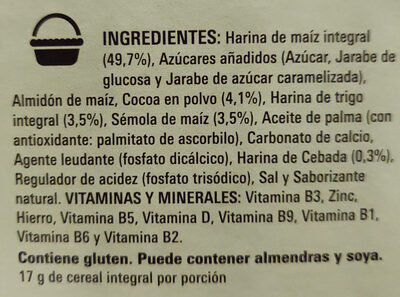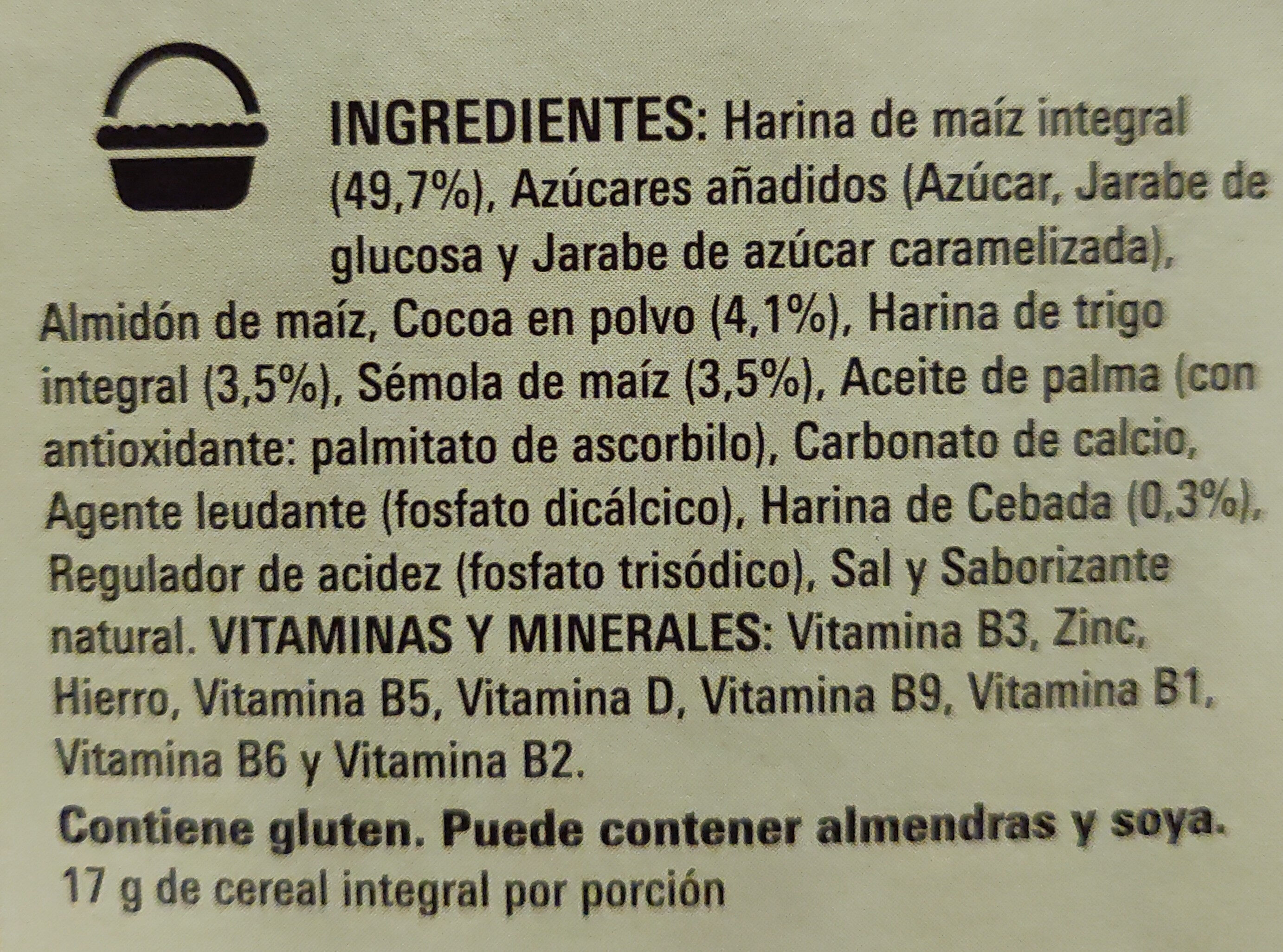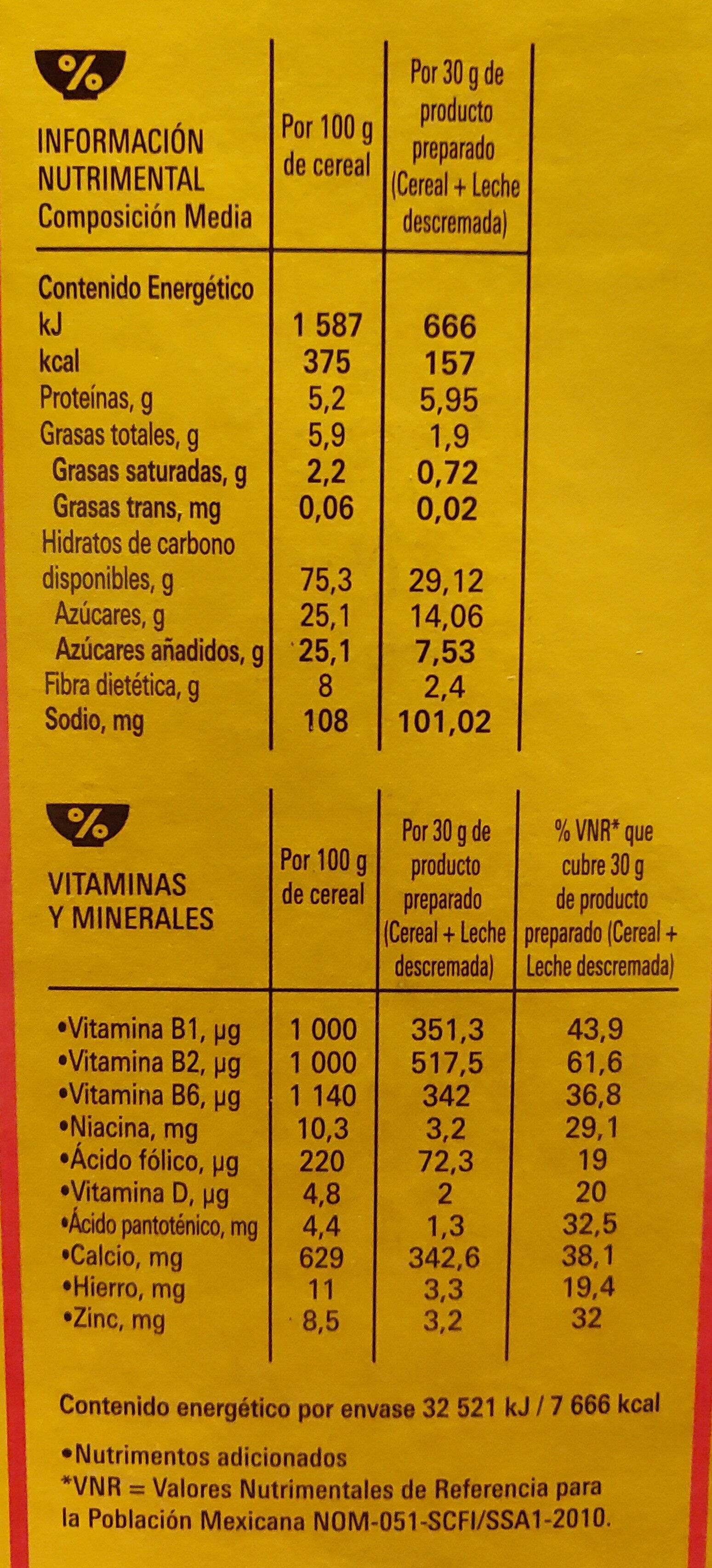Help us make food transparency the norm!
As a non-profit organization, we depend on your donations to continue informing consumers around the world about what they eat.
The food revolution starts with you!
CarlosV cereal - Nestlé - 1465 kg
CarlosV cereal - Nestlé - 1465 kg
This product page is not complete. You can help to complete it by editing it and adding more data from the photos we have, or by taking more photos using the app for Android or iPhone/iPad. Thank you!
×
Barcode: 7501058651280 (EAN / EAN-13)
Quantity: 1465 kg
Brands: Nestlé
Categories: Plant-based foods and beverages, Plant-based foods, Breakfasts, Cereals and potatoes, Cereals and their products, Breakfast cereals
Matching with your preferences
Health
Ingredients
-
32 ingredients
: Harina de maíz integral 49,7%, Azúcares añadidos (Azúcar, Jarabe de glucosa y Jarabe de azúcar caramelizada), Almidón de maíz, Cocoa en polvo 4,1%, Harina de trigo integral 3,5%, Sémola de maíz 3,5%, Aceite de palma (con antioxidante: palmitato de ascorbilo), Carbonato de calcio, Agente leudante (fosfato dicálcico), Harina de Cebada 0,3%. Regulador de acidez (fosfato trisódico), Sal y Saborizante natural. VITAMINAS Y MINERALES: Vitamina B3, Zinc, Hierro, Vitamina B5, Vitamina D, Vitamina B9, Vitamina B1, Vitamina B6 y Vitamina B2. Contiene gluten.Allergens: GlutenTraces: Nuts, Soybeans
Food processing
-
Ultra processed foods
Elements that indicate the product is in the 4 - Ultra processed food and drink products group:
- Ingredient: Flavouring
Food products are classified into 4 groups according to their degree of processing:
- Unprocessed or minimally processed foods
- Processed culinary ingredients
- Processed foods
- Ultra processed foods
The determination of the group is based on the category of the product and on the ingredients it contains.
Additives
-
E304 - Fatty acid esters of ascorbic acid
Ascorbyl palmitate: Ascorbyl palmitate is an ester formed from ascorbic acid and palmitic acid creating a fat-soluble form of vitamin C. In addition to its use as a source of vitamin C, it is also used as an antioxidant food additive -E number E304-. It is approved for use as a food additive in the EU, the U.S., Canada, Australia, and New Zealand.Ascorbyl palmitate is known to be broken down -through the digestive process- into ascorbic acid and palmitic acid -a saturated fatty acid- before being absorbed into the bloodstream. Ascorbyl palmitate is also marketed as "vitamin C ester".Source: Wikipedia
-
E304i - Ascorbyl palmitate
Ascorbyl palmitate: Ascorbyl palmitate is an ester formed from ascorbic acid and palmitic acid creating a fat-soluble form of vitamin C. In addition to its use as a source of vitamin C, it is also used as an antioxidant food additive -E number E304-. It is approved for use as a food additive in the EU, the U.S., Canada, Australia, and New Zealand.Ascorbyl palmitate is known to be broken down -through the digestive process- into ascorbic acid and palmitic acid -a saturated fatty acid- before being absorbed into the bloodstream. Ascorbyl palmitate is also marketed as "vitamin C ester".Source: Wikipedia
-
E339 - Sodium phosphates
Sodium phosphates: Sodium phosphate is a generic term for a variety of salts of sodium -Na+- and phosphate -PO43−-. Phosphate also forms families or condensed anions including di-, tri-, tetra-, and polyphosphates. Most of these salts are known in both anhydrous -water-free- and hydrated forms. The hydrates are more common than the anhydrous forms.Source: Wikipedia
-
E339iii - Trisodium phosphate
Sodium phosphates: Sodium phosphate is a generic term for a variety of salts of sodium -Na+- and phosphate -PO43−-. Phosphate also forms families or condensed anions including di-, tri-, tetra-, and polyphosphates. Most of these salts are known in both anhydrous -water-free- and hydrated forms. The hydrates are more common than the anhydrous forms.Source: Wikipedia
-
E341 - Calcium phosphates
Calcium phosphate: Calcium phosphate is a family of materials and minerals containing calcium ions -Ca2+- together with inorganic phosphate anions. Some so-called calcium phosphates contain oxide and hydroxide as well. They are white solids of nutritious value.Source: Wikipedia
-
E341ii - Dicalcium phosphate
Calcium phosphate: Calcium phosphate is a family of materials and minerals containing calcium ions -Ca2+- together with inorganic phosphate anions. Some so-called calcium phosphates contain oxide and hydroxide as well. They are white solids of nutritious value.Source: Wikipedia
Ingredients analysis
-
Palm oil
Ingredients that contain palm oil: Palm oil
-
Vegan status unknown
Unrecognized ingredients: Added sugar, es:jarabe-de-glucosa-y-jarabe-de-azucar-caramelizada, Zinc, Iron, Vitamin D, Folic acid, ThiaminSome ingredients could not be recognized.
We need your help!
You can help us recognize more ingredients and better analyze the list of ingredients for this product and others:
- Edit this product page to correct spelling mistakes in the ingredients list, and/or to remove ingredients in other languages and sentences that are not related to the ingredients.
- Add new entries, synonyms or translations to our multilingual lists of ingredients, ingredient processing methods, and labels.
If you would like to help, join the #ingredients channel on our Slack discussion space and/or learn about ingredients analysis on our wiki. Thank you!
-
Vegetarian status unknown
Unrecognized ingredients: Added sugar, es:jarabe-de-glucosa-y-jarabe-de-azucar-caramelizada, Zinc, Iron, Vitamin D, Folic acid, ThiaminSome ingredients could not be recognized.
We need your help!
You can help us recognize more ingredients and better analyze the list of ingredients for this product and others:
- Edit this product page to correct spelling mistakes in the ingredients list, and/or to remove ingredients in other languages and sentences that are not related to the ingredients.
- Add new entries, synonyms or translations to our multilingual lists of ingredients, ingredient processing methods, and labels.
If you would like to help, join the #ingredients channel on our Slack discussion space and/or learn about ingredients analysis on our wiki. Thank you!
-
Details of the analysis of the ingredients
We need your help!
Some ingredients could not be recognized.
We need your help!
You can help us recognize more ingredients and better analyze the list of ingredients for this product and others:
- Edit this product page to correct spelling mistakes in the ingredients list, and/or to remove ingredients in other languages and sentences that are not related to the ingredients.
- Add new entries, synonyms or translations to our multilingual lists of ingredients, ingredient processing methods, and labels.
If you would like to help, join the #ingredients channel on our Slack discussion space and/or learn about ingredients analysis on our wiki. Thank you!
: Harina de maíz integral 49.7%, Azúcares añadidos (Azúcar, Jarabe de glucosa y Jarabe de azúcar caramelizada), Almidón de maíz, Cocoa en polvo 4.1%, Harina de trigo integral 3.5%, Sémola de maíz 3.5%, Aceite de palma (con antioxidante (palmitato de ascorbilo)), Carbonato de calcio, Agente leudante (fosfato dicálcico), Harina de Cebada 0.3%, Regulador de acidez (fosfato trisódico), Sal, Saborizante natural, VITAMINAS, MINERALES (Vitamina B3), Zinc, Hierro, vitaminas, vitamina B5, Vitamina D, Vitamina B9, vitaminas, vitamina B1, Vitamina B6, Vitamina B2- Harina de maíz integral -> en:whole-grain-corn-flour - vegan: yes - vegetarian: yes - ciqual_food_code: 9545 - percent_min: 49.7 - percent: 49.7 - percent_max: 49.7
- Azúcares añadidos -> en:added-sugar - percent_min: 4.1 - percent_max: 33.9
- Azúcar -> en:sugar - vegan: yes - vegetarian: yes - ciqual_proxy_food_code: 31016 - percent_min: 2.05 - percent_max: 25.1
- Jarabe de glucosa y Jarabe de azúcar caramelizada -> es:jarabe-de-glucosa-y-jarabe-de-azucar-caramelizada - percent_min: 0 - percent_max: 16.95
- Almidón de maíz -> en:corn-starch - vegan: yes - vegetarian: yes - ciqual_food_code: 9510 - percent_min: 4.1 - percent_max: 29.2333333333333
- Cocoa en polvo -> en:cocoa-powder - vegan: yes - vegetarian: yes - ciqual_food_code: 18100 - percent_min: 4.1 - percent: 4.1 - percent_max: 4.1
- Harina de trigo integral -> en:whole-wheat-flour - vegan: yes - vegetarian: yes - ciqual_proxy_food_code: 9410 - percent_min: 3.5 - percent: 3.5 - percent_max: 3.5
- Sémola de maíz -> en:cornmeal - vegan: yes - vegetarian: yes - ciqual_food_code: 9615 - percent_min: 3.5 - percent: 3.5 - percent_max: 3.5
- Aceite de palma -> en:palm-oil - vegan: yes - vegetarian: yes - from_palm_oil: yes - ciqual_food_code: 16129 - percent_min: 0.3 - percent_max: 3.5
- con antioxidante -> en:antioxidant - percent_min: 0.3 - percent_max: 3.5
- palmitato de ascorbilo -> en:e304i - vegan: yes - vegetarian: yes - from_palm_oil: maybe - percent_min: 0.3 - percent_max: 3.5
- con antioxidante -> en:antioxidant - percent_min: 0.3 - percent_max: 3.5
- Carbonato de calcio -> en:e170i - vegan: maybe - vegetarian: maybe - percent_min: 0.3 - percent_max: 3.5
- Agente leudante -> en:raising-agent - percent_min: 0.3 - percent_max: 3.5
- fosfato dicálcico -> en:e341ii - vegan: yes - vegetarian: yes - percent_min: 0.3 - percent_max: 3.5
- Harina de Cebada -> en:barley-flour - vegan: yes - vegetarian: yes - ciqual_food_code: 9550 - percent_min: 0.3 - percent: 0.3 - percent_max: 0.3
- Regulador de acidez -> en:acidity-regulator - percent_min: 0 - percent_max: 0.3
- fosfato trisódico -> en:e339iii - vegan: yes - vegetarian: yes - percent_min: 0 - percent_max: 0.3
- Sal -> en:salt - vegan: yes - vegetarian: yes - ciqual_food_code: 11058 - percent_min: 0 - percent_max: 0.27432
- Saborizante natural -> en:natural-flavouring - vegan: maybe - vegetarian: maybe - percent_min: 0 - percent_max: 0.27432
- VITAMINAS -> en:vitamins - vegan: yes - vegetarian: yes - percent_min: 0 - percent_max: 0.27432
- MINERALES -> en:minerals - percent_min: 0 - percent_max: 0.27432
- Vitamina B3 -> en:e375 - vegan: maybe - vegetarian: maybe - percent_min: 0 - percent_max: 0.27432
- Zinc -> en:zinc - percent_min: 0 - percent_max: 0.27432
- Hierro -> en:iron - percent_min: 0 - percent_max: 0.27432
- vitaminas -> en:vitamins - vegan: yes - vegetarian: yes - percent_min: 0 - percent_max: 0.27432
- vitamina B5 -> en:pantothenic-acid - vegan: yes - vegetarian: yes - percent_min: 0 - percent_max: 0.27432
- Vitamina D -> en:vitamin-d - percent_min: 0 - percent_max: 0.27432
- Vitamina B9 -> en:folic-acid - percent_min: 0 - percent_max: 0.27432
- vitaminas -> en:vitamins - vegan: yes - vegetarian: yes - percent_min: 0 - percent_max: 0.27432
- vitamina B1 -> en:thiamin - percent_min: 0 - percent_max: 0.27432
- Vitamina B6 -> en:vitamin-b6 - vegan: yes - vegetarian: yes - percent_min: 0 - percent_max: 0.27432
- Vitamina B2 -> en:e101 - vegan: maybe - vegetarian: yes - percent_min: 0 - percent_max: 0.27432
Nutrition
-
Missing data to compute the Nutri-Score
Missing nutrition facts
⚠ ️The nutrition facts of the product must be specified in order to compute the Nutri-Score.Could you add the information needed to compute the Nutri-Score? Add nutrition facts
-
Nutrient levels
-
Fat in moderate quantity (5.9%)
What you need to know- A high consumption of fat, especially saturated fats, can raise cholesterol, which increases the risk of heart diseases.
Recommendation: Limit the consumption of fat and saturated fat- Choose products with lower fat and saturated fat content.
-
Sugars in high quantity (25.1%)
What you need to know- A high consumption of sugar can cause weight gain and tooth decay. It also augments the risk of type 2 diabetes and cardio-vascular diseases.
Recommendation: Limit the consumption of sugar and sugary drinks- Sugary drinks (such as sodas, fruit beverages, and fruit juices and nectars) should be limited as much as possible (no more than 1 glass a day).
- Choose products with lower sugar content and reduce the consumption of products with added sugars.
-
Salt in low quantity (0.274%)
What you need to know- A high consumption of salt (or sodium) can cause raised blood pressure, which can increase the risk of heart disease and stroke.
- Many people who have high blood pressure do not know it, as there are often no symptoms.
- Most people consume too much salt (on average 9 to 12 grams per day), around twice the recommended maximum level of intake.
Recommendation: Limit the consumption of salt and salted food- Reduce the quantity of salt used when cooking, and don't salt again at the table.
- Limit the consumption of salty snacks and choose products with lower salt content.
-
-
Nutrition facts
Nutrition facts As sold
for 100 g / 100 mlCompared to: Breakfast cereals Energy 1,569 kj
(375 kcal)-5% Fat 5.9 g -29% Saturated fat ? Monounsaturated fat 2.2 g +12% Trans fat 0 g Carbohydrates 75.3 g +14% Sugars 25.1 g +63% Fiber 8 g +6% Proteins 5.2 g -46% Salt 0.274 g -31% Vitamin D 4.8 µg +15% Vitamin B1 (Thiamin) 1 mg +3% Vitamin B3/PP (Niacin) 10.3 mg -10% Vitamin B6 (Pyridoxin) 1.14 mg -7% Vitamin B9 (Folic acid) 220 µg +26% Vitamin B12 (cobalamin) 1,000 µg +29,486% Vitamin B5 (Pantothenic acid) 4.4 mg +7% Calcium 629 mg +286% Iron 11 mg +26% Zinc 8.5 mg +71% Fruits‚ vegetables‚ nuts and rapeseed‚ walnut and olive oils (estimate from ingredients list analysis) 0 %
Environment
-
Eco-Score E - Very high environmental impact
⚠ ️Select a country in order to include the full impact of transportation.The Eco-Score is an experimental score that summarizes the environmental impacts of food products.→ The Eco-Score was initially developped for France and it is being extended to other European countries. The Eco-Score formula is subject to change as it is regularly improved to make it more precise and better suited to each country.Life cycle analysis
-
Average impact of products of the same category: C (Score: 45/100)
Category: Breakfast cereals, mix of puffed or extruded cereals, fortified with vitamins and chemical elements
Category: Breakfast cereals, mix of puffed or extruded cereals, fortified with vitamins and chemical elements
- PEF environmental score: 0.63 (the lower the score, the lower the impact)
- including impact on climate change: 3.56 kg CO2 eq/kg of product
Stage Impact Agriculture
79.2 %Processing
12.4 %Packaging
3.8 %Transportation
3.9 %Distribution
0.8 %Consumption
0.0 %
Bonuses and maluses
-
Missing origins of ingredients information
Malus: -5
⚠ ️ The origins of the ingredients of this product are not indicated.
If they are indicated on the packaging, you can modify the product sheet and add them.
If you are the manufacturer of this product, you can send us the information with our free platform for producers.
-
Ingredients that threatens species
Malus: -10
Contains palm oil
Tropical forests in Asia, Africa and Latin America are destroyed to create and expand oil palm tree plantations. The deforestation contributes to climate change, and it endangers species such as the orangutan, the pigmy elephant and the Sumatran rhino.
-
Missing packaging information for this product
Malus: -15
⚠ ️ The information about the packaging of this product is not filled in.⚠ ️ For a more precise calculation of the Eco-Score, you can modify the product page and add them.
If you are the manufacturer of this product, you can send us the information with our free platform for producers.
Eco-Score for this product
-
Impact for this product: E (Score: 15/100)
Product: CarlosV cereal - Nestlé - 1465 kg
Life cycle analysis score: 45
Sum of bonuses and maluses: -30
Final score: 15/100
-
Carbon footprint
-
Equal to driving 1.8 km in a petrol car
356 g CO² per 100g of product
The carbon emission figure comes from ADEME's Agribalyse database, for the category: Breakfast cereals, mix of puffed or extruded cereals, fortified with vitamins and chemical elements (Source: ADEME Agribalyse Database)
Stage Impact Agriculture
62.8 %Processing
21.6 %Packaging
7.9 %Transportation
7.1 %Distribution
0.5 %Consumption
0.0 %
Packaging
-
Missing packaging information for this product
⚠ ️ The information about the packaging of this product is not filled in.Take a photo of the recycling information Take a photo of the recycling information
Transportation
-
Origins of ingredients
Missing origins of ingredients information
⚠ ️ The origins of the ingredients of this product are not indicated.
If they are indicated on the packaging, you can modify the product sheet and add them.
If you are the manufacturer of this product, you can send us the information with our free platform for producers.Add the origins of ingredients for this product Add the origins of ingredients for this product
Threatened species
-
Contains palm oil
Drives deforestation and threatens species such as the orangutan
Tropical forests in Asia, Africa and Latin America are destroyed to create and expand oil palm tree plantations. The deforestation contributes to climate change, and it endangers species such as the orangutan, the pigmy elephant and the Sumatran rhino.
Report a problem
-
Incomplete or incorrect information?
Category, labels, ingredients, allergens, nutritional information, photos etc.
If the information does not match the information on the packaging, please complete or correct it. Open Food Facts is a collaborative database, and every contribution is useful for all.
Data sources
Product added on by liposoluble
Last edit of product page on by liposoluble.
Product page also edited by openfoodfacts-contributors.











